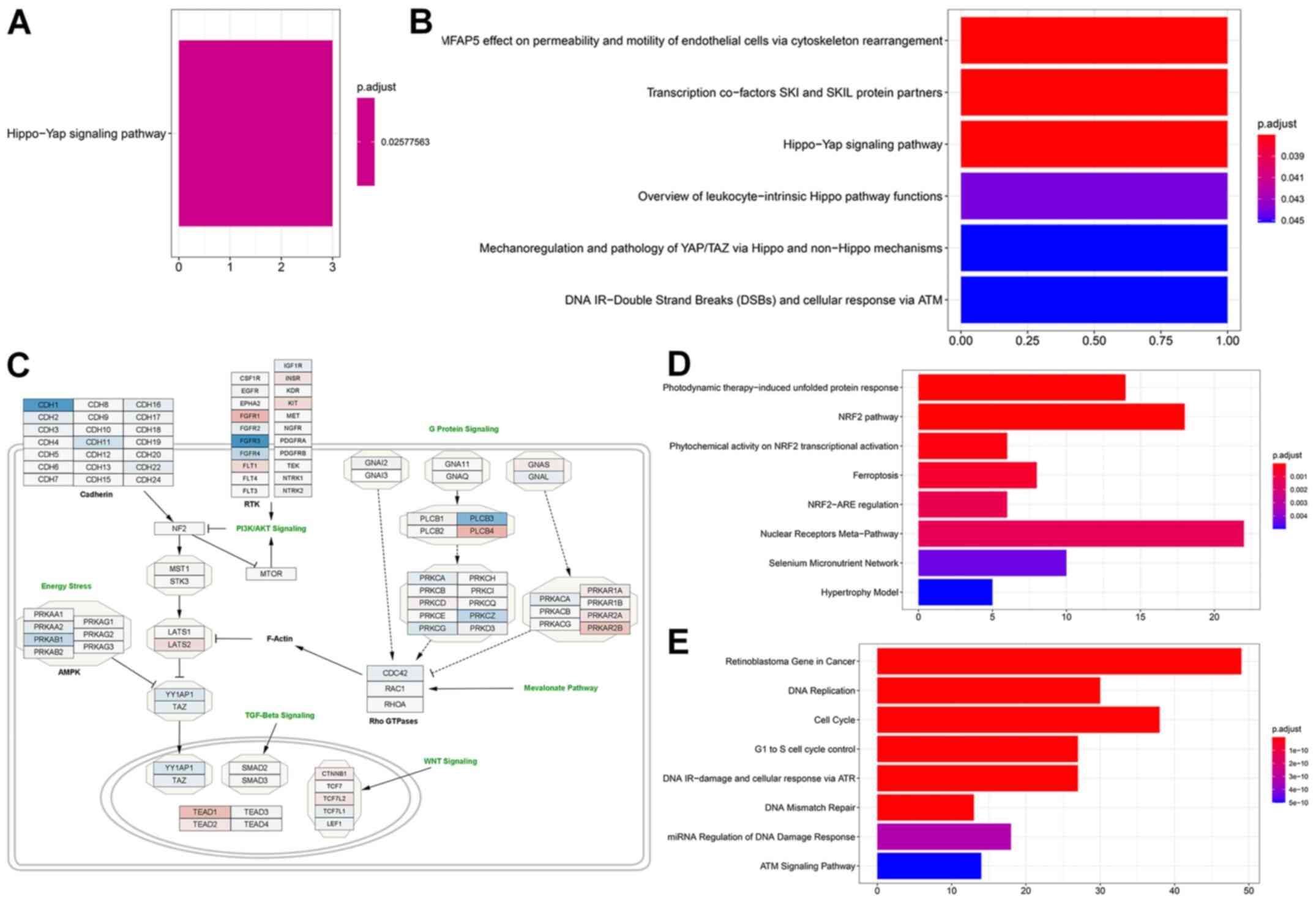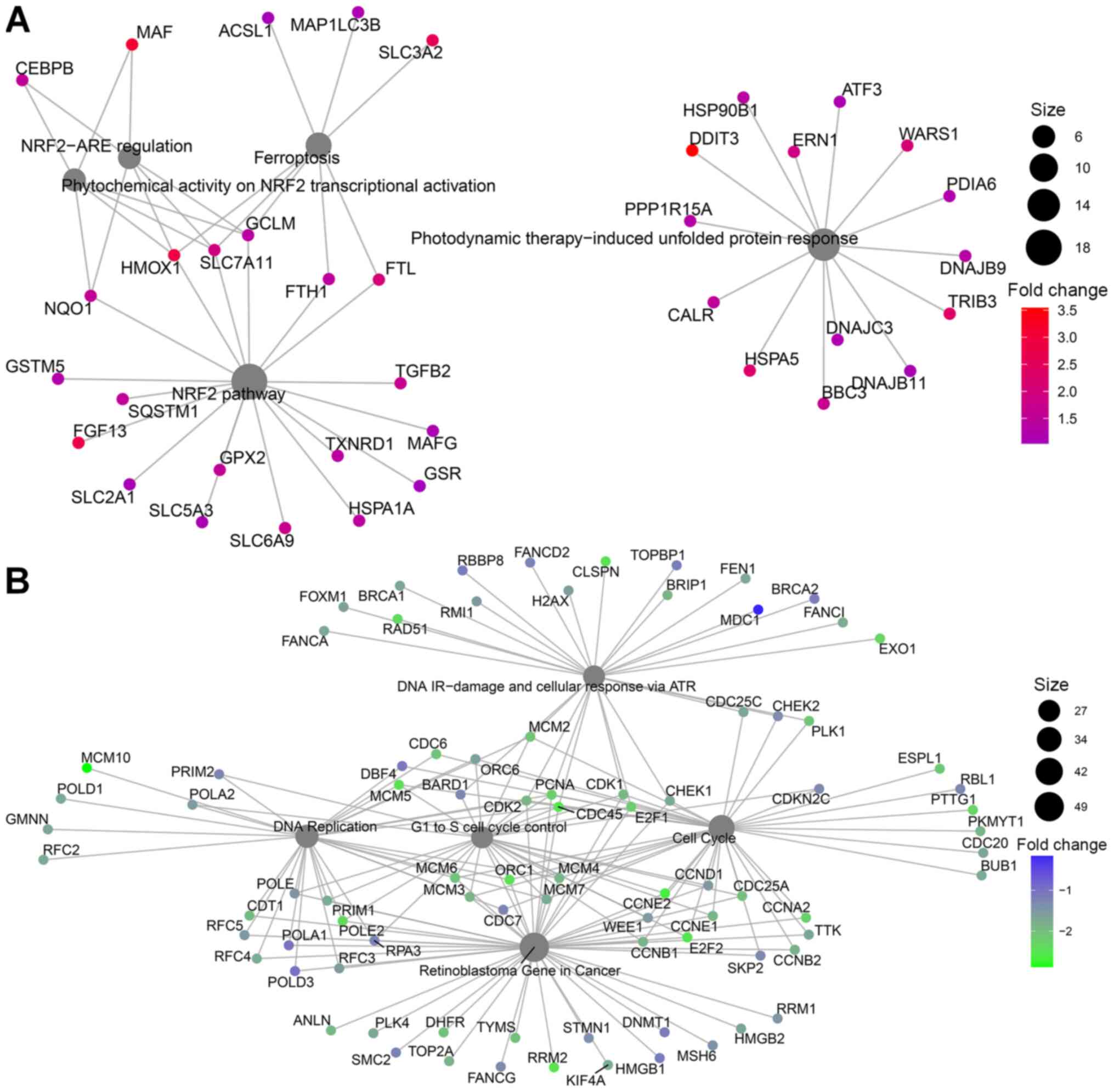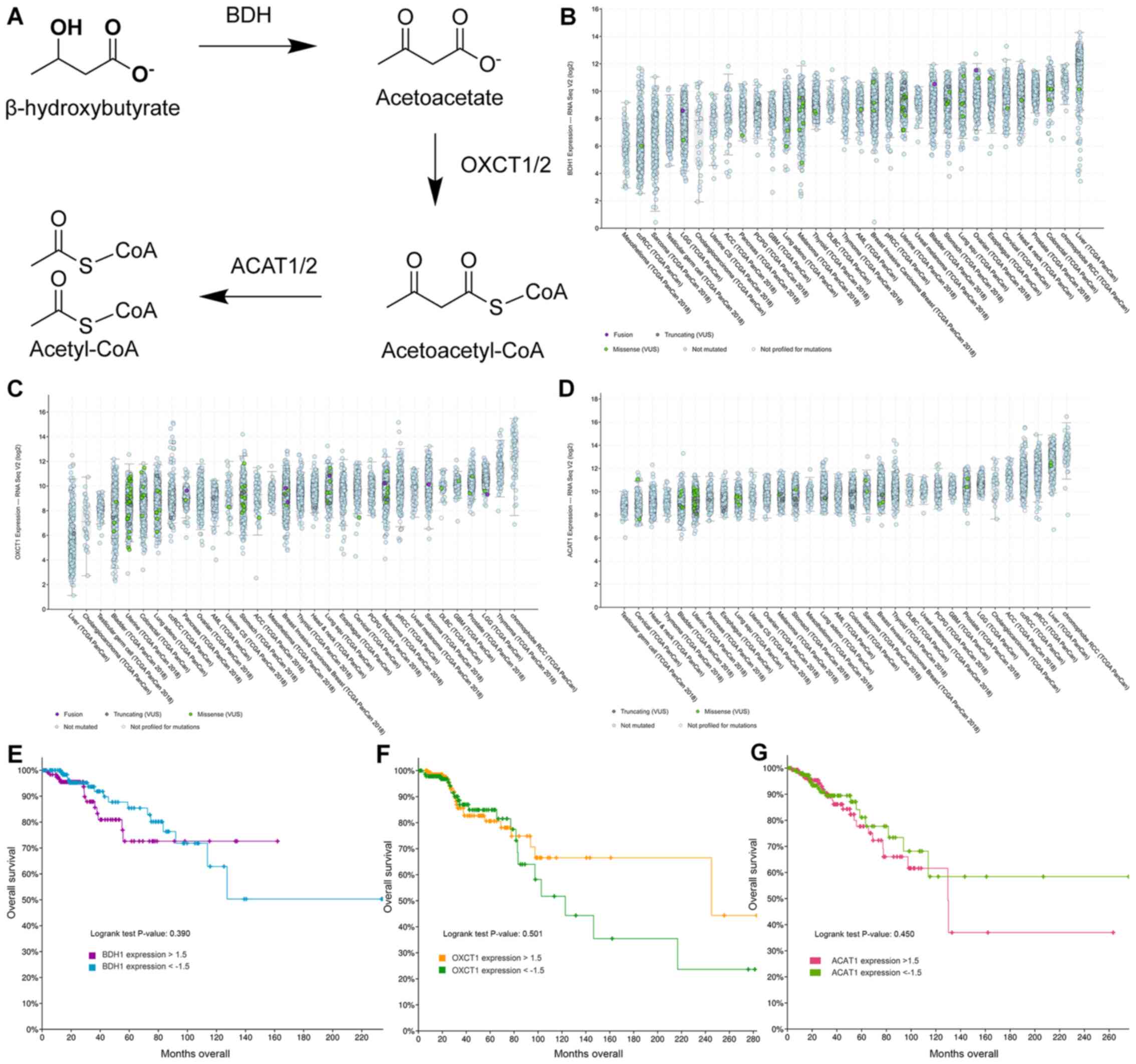|
1
|
Warburg O: On the origin of cancer cells.
Science. 123:309–314. 1956. View Article : Google Scholar : PubMed/NCBI
|
|
2
|
Arora R, Schmitt D, Karanam B, Tan M,
Yates C and Dean-Colomb W: Inhibition of the Warburg effect with a
natural compound reveals a novel measurement for determining the
metastatic potential of breast cancers. Oncotarget. 6:662–678.
2015. View Article : Google Scholar : PubMed/NCBI
|
|
3
|
Warburg O, Wind F and Negelein E: The
metabolism of tumors in the body. J Gen Physiol. 8:519–530. 1927.
View Article : Google Scholar : PubMed/NCBI
|
|
4
|
Nebeling LC, Miraldi F, Shurin SB and
Lerner E: Effects of a ketogenic diet on tumor metabolism and
nutritional status in pediatric oncology patients: Two case
reports. J Am Coll Nutr. 14:202–208. 1995. View Article : Google Scholar : PubMed/NCBI
|
|
5
|
Li Z and Heber D: Ketogenic diets. JAMA.
323:3862020. View Article : Google Scholar : PubMed/NCBI
|
|
6
|
Bueno NB, de Melo IS, de Oliveira SL and
da Rocha Ataide T: Very-low-carbohydrate ketogenic diet v. low-fat
diet for long-term weight loss: A meta-analysis of randomised
controlled trials. Br J Nutr. 110:1178–1187. 2013. View Article : Google Scholar : PubMed/NCBI
|
|
7
|
Martin-McGill KJ, Jackson CF, Bresnahan R,
Levy RG and Cooper PN: Ketogenic diets for drug-resistant epilepsy.
Cochrane Database Syst Rev. 11:CD0019032018.PubMed/NCBI
|
|
8
|
Clifton P, Carter S, Headland M and Keogh
J: Low carbohydrate and ketogenic diets in type 2 diabetes. Curr
Opin Lipidol. 26:594–595. 2015. View Article : Google Scholar : PubMed/NCBI
|
|
9
|
Masino SA and Rho JM: Mechanisms of
ketogenic diet action. Jasper's Basic Mechanisms of the Epilepsies.
4th edition. Noebels JL, Avoli M, Rogawski MA, Olsen RW and
Delgado-Escueta AV: National Center for Biotechnology Information;
Bethesda, MD: pp. 1483–1516. 2012
|
|
10
|
Erickson N, Boscheri A, Linke B and
Huebner J: Systematic review: Isocaloric ketogenic dietary regimes
for cancer patients. Med Oncol. 34:722017. View Article : Google Scholar : PubMed/NCBI
|
|
11
|
Klement RJ: Beneficial effects of
ketogenic diets for cancer patients: A realist review with focus on
evidence and confirmation. Med Oncol. 34:1322017. View Article : Google Scholar : PubMed/NCBI
|
|
12
|
Klement RJ, Champ CE, Otto C and Kämmerer
U: Anti-tumor effects of ketogenic diets in mice: A meta-analysis.
PLoS One. 11:e01550502016. View Article : Google Scholar : PubMed/NCBI
|
|
13
|
Rieger J, Bähr O, Maurer GD, Hattingen E,
Franz K, Brucker D, Walenta S, Kämmerer U, Coy JF, Weller M and
Steinbach JP: ERGO: A pilot study of ketogenic diet in recurrent
glioblastoma. Int J Oncol. 44:1843–1852. 2014. View Article : Google Scholar : PubMed/NCBI
|
|
14
|
Kadochi Y, Mori S, Fujiwara-Tani R, Luo Y,
Nishiguchi Y, Kishi S, Fujii K, Ohmori H and Kuniyasu H: Remodeling
of energy metabolism by a ketone body and medium-chain fatty acid
suppressed the proliferation of CT26 mouse colon cancer cells.
Oncol Lett. 14:673–680. 2017. View Article : Google Scholar : PubMed/NCBI
|
|
15
|
Bartmann C, Janaki Raman SR, Flöter J,
Schulze A, Bahlke K, Willingstorfer J, Strunz M, Wöckel A, Klement
RJ, Kapp M, et al: Beta-hydroxybutyrate (3-OHB) can influence the
energetic phenotype of breast cancer cells, but does not impact
their proliferation and the response to chemotherapy or radiation.
Cancer Metab. 6:82018. View Article : Google Scholar : PubMed/NCBI
|
|
16
|
Huang D, Li T, Wang L, Zhang L, Yan R, Li
K, Xing S, Wu G, Hu L, Jia W, et al: Hepatocellular carcinoma
redirects to ketolysis for progression under nutrition deprivation
stress. Cell Res. 26:1112–1130. 2016. View Article : Google Scholar : PubMed/NCBI
|
|
17
|
Hao GW, Chen YS, He DM, Wang HY, Wu GH and
Zhang B: Growth of human colon cancer cells in nude mice is delayed
by ketogenic diet with or without omega-3 fatty acids and
medium-chain triglycerides. Asian Pac J Cancer Prev. 16:2061–2068.
2015. View Article : Google Scholar : PubMed/NCBI
|
|
18
|
Poff AM, Ari C, Arnold P, Seyfried TN and
D'Agostino DP: Ketone supplementation decreases tumor cell
viability and prolongs survival of mice with metastatic cancer. Int
J Cancer. 135:1711–1720. 2014. View Article : Google Scholar : PubMed/NCBI
|
|
19
|
Martinez-Outschoorn UE, Lin Z,
Whitaker-Menezes D, Howell A, Sotgia F and Lisanti MP: Ketone body
utilization drives tumor growth and metastasis. Cell Cycle.
11:3964–3971. 2012. View
Article : Google Scholar : PubMed/NCBI
|
|
20
|
Schwartz KA, Noel M, Nikolai M and Chang
HT: Investigating the ketogenic diet as treatment for primary
aggressive brain cancer: Challenges and lessons learned. Front
Nutr. 5:112018. View Article : Google Scholar : PubMed/NCBI
|
|
21
|
Newman JC and Verdin E: β-Hydroxybutyrate:
A signaling metabolite. Annu Rev Nutr. 37:51–76. 2017. View Article : Google Scholar : PubMed/NCBI
|
|
22
|
Dai X, Cheng H, Bai Z and Li J: Breast
cancer cell line classification and its relevance with breast tumor
subtyping. J Cancer. 8:3131–3141. 2017. View Article : Google Scholar : PubMed/NCBI
|
|
23
|
Bray NL, Pimentel H, Melsted P and Pachter
L: Near-optimal probabilistic RNA-seq quantification. Nat
Biotechnol. 34:525–527. 2016. View Article : Google Scholar : PubMed/NCBI
|
|
24
|
Love MI, Huber W and Anders S: Moderated
estimation of fold change and dispersion for RNA-seq data with
DESeq2. Genome Biol. 15:5502014. View Article : Google Scholar : PubMed/NCBI
|
|
25
|
Stephens M: False discovery rates: A new
deal. Biostatistics. 18:275–294. 2017.PubMed/NCBI
|
|
26
|
Huber W, Carey VJ, Gentleman R, Anders S,
Carlson M, Carvalho BS, Bravo HC, Davis S, Gatto L, Girke T, et al:
Orchestrating high-throughput genomic analysis with Bioconductor.
Nat Methods. 12:115–121. 2015. View Article : Google Scholar : PubMed/NCBI
|
|
27
|
Gentleman RC, Carey VJ, Bates DM, Bolstad
B, Dettling M, Dudoit S, Ellis B, Gautier L, Ge Y, Gentry J, et al:
Bioconductor: Open software development for computational biology
and bioinformatics. Genome Biol. 5:R802004. View Article : Google Scholar : PubMed/NCBI
|
|
28
|
R Core Team: R: A language and environment
for statistical computing. simplehttps://www.R-project.org/February 10–2015
|
|
29
|
Slenter DN, Kutmon M, Hanspers K, Riutta
A, Windsor J, Nunes N, Mélius J, Cirillo E, Coort SL, Digles D, et
al: WikiPathways: A multifaceted pathway database bridging
metabolomics to other omics research. Nucleic Acids Res.
46(D1):D661–D667. 2018. View Article : Google Scholar
|
|
30
|
Gustavsen JA, Pai S, Isserlin R, Demchak B
and Pico AR: RCy3: Network biology using cytoscape from within R.
F1000Res. 8:17742019. View Article : Google Scholar : PubMed/NCBI
|
|
31
|
Shannon P, Markiel A, Ozier O, Baliga NS,
Wang JT, Ramage D, Amin N, Schwikowski B and Ideker T: Cytoscape: A
software environment for integrated models of biomolecular
interaction networks. Genome Res. 13:2498–2504. 2003. View Article : Google Scholar : PubMed/NCBI
|
|
32
|
Benjamini Y and Hochberg Y: Controlling
the false discovery rate: A practical and powerful approach to
multiple testing. J R Stat Soc B. 57:289–300. 1995.
|
|
33
|
Kutmon M, Lotia S, Evelo CT and Pico AR:
WikiPathways app for cytoscape: Making biological pathways amenable
to network analysis and visualization. F1000 Res. 3:1522014.
View Article : Google Scholar
|
|
34
|
Yu G, Wang LG, Han Y and He QY:
ClusterProfiler: An R package for comparing biological themes among
gene clusters. OMICS. 16:284–287. 2012. View Article : Google Scholar : PubMed/NCBI
|
|
35
|
Cerami E, Gao J, Dogrusoz U, Gross BE,
Sumer SO, Aksoy BA, Jacobsen A, Byrne CJ, Heuer ML, Larsson E, et
al: The cBio cancer genomics portal: An open platform for exploring
multidimensional cancer genomics data. Cancer Discov. 2:401–404.
2012. View Article : Google Scholar : PubMed/NCBI
|
|
36
|
Gao J, Aksoy BA, Dogrusoz U, Dresdner G,
Gross B, Sumer SO, Sun Y, Jacobsen A, Sinha R, Larsson E, et al:
Integrative analysis of complex cancer genomics and clinical
profiles using the cBioPortal. Sci Signal. 6:pl12013. View Article : Google Scholar : PubMed/NCBI
|
|
37
|
VanItallie TB and Nufert TH: Ketones:
Metabolism's ugly duckling. Nutr Rev. 61:327–341. 2003. View Article : Google Scholar : PubMed/NCBI
|
|
38
|
Katashima R, Iwahana H, Fujimura M,
Yamaoka T, Ishizuka T, Tatibana M and Itakura M: Molecular cloning
of a human cDNA for the 41-kDa phosphoribosylpyrophosphate
synthetase-associated protein. Biochim Biophys Acta. 1396:245–250.
1998. View Article : Google Scholar : PubMed/NCBI
|
|
39
|
Hanahan D and Weinberg RA: Hallmarks of
cancer: The next generation. Cell. 144:646–674. 2011. View Article : Google Scholar : PubMed/NCBI
|
|
40
|
Mathews EH, Visagie MH, Meyer AA, Joubert
AM and Mathews GE: In vitro quantification: Long-term effect of
glucose deprivation on various cancer cell lines. Nutrition.
74:1107482020. View Article : Google Scholar : PubMed/NCBI
|
|
41
|
Badouel C and McNeill H: SnapShot: The
hippo signaling pathway. Cell. 145:484–484.e1. 2011. View Article : Google Scholar : PubMed/NCBI
|
|
42
|
Araki N, Takeshima H and Saya H:
Neurofibromatosis type 2 (NF2). Gan To Kagaku Ryoho. 24:1427–1431.
1997.(In Japanese). PubMed/NCBI
|
|
43
|
Fossdal R, Jonasson F, Kristjansdottir GT,
Kong A, Stefansson H, Gosh S, Gulcher JR and Stefansson K: A novel
TEAD1 mutation is the causative allele in Sveinsson's chorioretinal
atrophy (helicoid peripapillary chorioretinal degeneration). Hum
Mol Genet. 13:975–981. 2004. View Article : Google Scholar : PubMed/NCBI
|
|
44
|
González-Alonso P, Zazo S, Martín-Aparicio
E, Luque M, Chamizo C, Sanz-Álvarez M, Minguez P, Gómez-López G,
Cristóbal I, Caramés C, et al: The hippo pathway transducers
YAP1/TEAD induce acquired resistance to trastuzumab in
HER2-positive breast cancer. Cancers (Basel). 12:11082020.
View Article : Google Scholar
|
|
45
|
Rigiracciolo DC, Nohata N, Lappano R,
Cirillo F, Talia M, Scordamaglia D, Gutkind JS and Maggiolini M:
IGF-1/IGF-1R/FAK/YAP transduction signaling prompts growth effects
in triple-negative breast cancer (TNBC) cells. Cells. 9:10102020.
View Article : Google Scholar
|
|
46
|
Enzo E, Santinon G, Pocaterra A, Aragona
M, Bresolin S, Forcato M, Grifoni D, Pession A, Zanconato F, Guzzo
G, et al: Aerobic glycolysis tunes YAP/TAZ transcriptional
activity. EMBO J. 34:1349–1370. 2015. View Article : Google Scholar : PubMed/NCBI
|
|
47
|
Lin C and Xu X: YAP1-TEAD1-Glut1 axis
dictates the oncogenic phenotypes of breast cancer cells by
modulating glycolysis. Biomed Pharmacother. 95:789–794. 2017.
View Article : Google Scholar : PubMed/NCBI
|
|
48
|
Zheng X, Han H, Liu GP, Ma YX, Pan RL,
Sang LJ, Li RH, Yang LJ, Marks JR, Wang W and Lin A: LncRNA wires
up Hippo and Hedgehog signaling to reprogramme glucose metabolism.
EMBO J. 36:3325–3335. 2017. View Article : Google Scholar : PubMed/NCBI
|
|
49
|
Han C, Liu Y, Dai R, Ismail N, Su W and Li
B: Ferroptosis and its potential role in human diseases. Front
Pharmacol. 11:2392020. View Article : Google Scholar : PubMed/NCBI
|
|
50
|
Li J, Cao F, Yin HL, Huang ZJ, Lin ZT, Mao
N, Sun B and Wang G: Ferroptosis: Past, present and future. Cell
Death Dis. 11:882020. View Article : Google Scholar : PubMed/NCBI
|
|
51
|
Yamaguchi Y, Kasukabe T and Kumakura S:
Piperlongumine rapidly induces the death of human pancreatic cancer
cells mainly through the induction of ferroptosis. Int J Oncol.
52:1011–1022. 2018.PubMed/NCBI
|
|
52
|
Ou W, Mulik RS, Anwar A, McDonald JG, He X
and Corbin IR: Low-density lipoprotein docosahexaenoic acid
nanoparticles induce ferroptotic cell death in hepatocellular
carcinoma. Free Radic Biol Med. 112:597–607. 2017. View Article : Google Scholar : PubMed/NCBI
|
|
53
|
Chen MS, Wang SF, Hsu CY, Yin PH, Yeh TS,
Lee HC and Tseng LM: CHAC1 degradation of glutathione enhances
cystine-starvation-induced necroptosis and ferroptosis in human
triple negative breast cancer cells via the GCN2-eIF2α-ATF4
pathway. Oncotarget. 8:114588–114602. 2017. View Article : Google Scholar : PubMed/NCBI
|
|
54
|
Walker A, Singh A, Tully E, Woo J, Le A,
Nguyen T, Biswal S, Sharma D and Gabrielson E: Nrf2 signaling and
autophagy are complementary in protecting breast cancer cells
during glucose deprivation. Free Radic Biol Med. 120:407–413. 2018.
View Article : Google Scholar : PubMed/NCBI
|
|
55
|
Johnstone AM, Horgan GW, Murison SD,
Bremner DM and Lobley GE: Effects of a high-protein ketogenic diet
on hunger, appetite, and weight loss in obese men feeding ad
libitum. Am J Clin Nutr. 87:44–55. 2008. View Article : Google Scholar : PubMed/NCBI
|
|
56
|
Gwangwa MV, Joubert AM and Visagie MH:
Effects of glutamine deprivation on oxidative stress and cell
survival in breast cell lines. Biol Res. 52:152019. View Article : Google Scholar : PubMed/NCBI
|
|
57
|
Ko YH, Lin Z, Flomenberg N, Pestell RG,
Howell A, Sotgia F, Lisanti MP and Martinez-Outschoorn UE:
Glutamine fuels a vicious cycle of autophagy in the tumor stroma
and oxidative mitochondrial metabolism in epithelial cancer cells:
Implications for preventing chemotherapy resistance. Cancer Biol
Ther. 12:1085–1097. 2011. View Article : Google Scholar : PubMed/NCBI
|
|
58
|
Newman JC and Verdin E: Ketone bodies as
signaling metabolites. Trends Endocrinol Metab. 25:42–52. 2014.
View Article : Google Scholar : PubMed/NCBI
|
|
59
|
Rojas-Morales P, Tapia E and
Pedraza-Chaverri J: β-Hydroxybutyrate: A signaling metabolite in
starvation response? Cell Signal. 28:917–923. 2016. View Article : Google Scholar : PubMed/NCBI
|




















